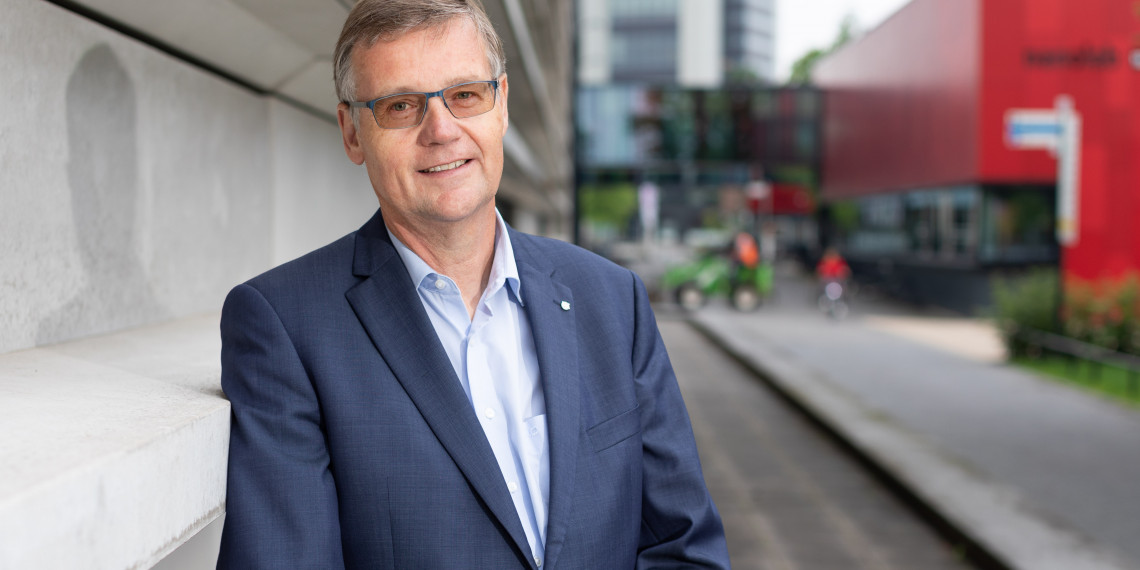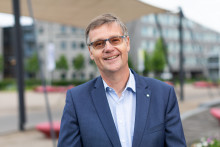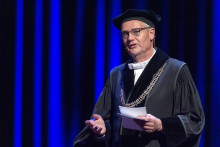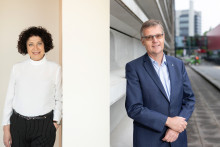The new educational vision of the UT is as good as done. Why was there a necessity for this vision?
‘Up to now, we didn’t have such an overarching educational vision. This vision stems from our efforts of writing a new vision for our master’s programmes. Due to a lack of support, we had to go back to the drawing board. Meanwhile reality caught up with us, partly due to the corona crisis. So we took a broader perspective: ‘How do we want to move forward with education, housing, digitalization and growth? Of course we already had partial visions and documents, but those were either no longer up-to-date or incomplete. Therefore a team wrote the vision on teaching and learning, to serve as a foundation for the future.’
In an elevator pitch, what do you deem the vision entails?
‘It rationalises the education we offer and what our goal is in terms of an educated UT student. In a nutshell: The student is at the helm while the education is interactive and small-scale. The teaching and working methods we choose fit this vision. Context also plays a central role here: we want to connect to issues from society, which fits with the identity of the university; Twente has always sought to connect with society more than other universities.’
‘This approach differs from the introduction of the Twente Educational Model (TOM), which was mainly top-down’.
That sounds equally logical, recognizable as multi-interpretable…
'Such an overarching vision shouldn’t be too specific. It is there to guide, support and encourage programmes. Every programme has its own flavour. It is exactly that local context and autonomy which is incredibly important. Yes, this approach differs from the introduction of the Twente Education Model (TOM, ed.), which was mainly top-down. This is not a one-size-fits-all doctrine. I don't want to enforce, but I do want to provide guidance. I believe in the responsibility of the organisation; people want to do the right things and I wholeheartedly believe in that.'
Isn’t offering so much space a potential pitfall? The university council recently quoted Aristotle in its advice: ‘A friend to all is a friend to none’. Will people embrace this if they are unable to grasp it?
‘That’s what we’ll work on with the implementation and communication once this vision is established. I want to put people in a position to internalize this vision. But that doesn’t mean that everybody has to radically overhaul their modules overnight. That’s why I want to insist: the implementation will occur at everybody’s own pace and at their own terms. I also want to avoid things taking on a life of their own, as was the case with challenge-based learning.’
‘Fully online education will not follow from this vision. We are not the Open Universiteit and neither are we turning into it.’
What are you implying with that?
‘Ever since that term was mentioned, people believed that all the education had to be challenge-based. But that is explicitly not stated in the vision. It is stated, however, that our education should have a societal dimension. This is often the case already, but people are not aware of it. My point is: Usually education does not have to be radically altered, as education is a process of continuous improvement. The same holds true also for blended learning, for example. We have become aware that old-fashioned lectures aren’t the most efficient way to transfer knowledge. But fully online education will not follow from this vision. We are not the Open Universiteit (fully online Dutch university aimed at part-time studying, ed.) and neither are we turning into it. At the same time – especially since the corona crisis – we have added an online dimension to our campus and our education. We will continue to explore that. This will also make our education more robust in case of a next pandemic.’
What will we already notice regarding the new vision in 2023?
‘In February, the document will be submitted to the university council for approval. If the council approves the document, we will begin. It will then start with the implementation: how do we want to use our campus and what resources do we need for this? Thus, this vision forms a springboard for underlying visions: those on strategic housing, online education and the aforementioned master vision. I expect us to make strides in 2023 in terms of teacher professionalisation; there is a high demand for courses in challenge-based- and blended learning. I also expect us to take a good look at other documents based on this vision. This way we will not only make the master vision more concrete, I presume we can also re-examine the Twente Education Model. Above all, what we need to do is work on the communication. We need to make it clear how we envision our education. That everyone understands: when you come here to study, this is what you're going to get from the UT.’

A new talent policy is also waiting in the wings. What consequences will this have for the university?
‘It stems from the recognition and rewards movement, which we as a university embrace. For years, academia has been all about research. But there are more dimensions that matter which we have identified in this policy document: education, organisation and society. The current golden standard is: if you have lots of publications and citations, you are doing well. Then no one will ask you how you teach. In the current system, someone who does a lot of research has a much easier time making a career than someone who spends half their time teaching. But we need the latter at least as much. Without students – and therefore teachers – there is no university. That is why we want to value education on an equal footing with research. It's about impact, in multiple forms.'
'Not everyone can be captain of the ship. You also need a helmsman and boatswain'
What do you perceive as impact?
'In particular, I focus on our approach to excellence. If you are among the top one percent most cited scientists in your field, are you excellent? That used to be the golden standard. But as far as I’m concerned, it is simple one way of looking at impact. The main consideration in research should not be that it should lead to multiple publications in Nature, instead it should be: what has my research done for society? Have I contributed to identifying and solving major societal problems?
What is also important in science is the team science approach. Nobody wins a grant or project on their own. We turn that collaborative spirit into this talent policy. Not everyone can be captain of the ship. You also need a helmsman and boatswain. But most importantly, you should be given the space to take on different roles over the course of your career.'
But is such a new approach actually measurable and comparable?
‘It will require the adaptation of one’s CV, containing more narrative. For example, take work done for a committee; you have been in a committee, but was that an active role and what kind of impact did you have? One can approach education similarly: Do you use the same slides for your lectures years on end, or are you consequently working on the integration of new didactical concepts and how does that affect the study success? Such are the things that you need to be demonstrate. But that shouldn’t become a checklist-matter by any means.’
What has to happen in 2023?
'We hope to launch the first pilots this year. As far as I am concerned, this starts with training supervisors; they have a key role in recognition and rewards. There is no doubt mistakes will be made along the way, but this movement is in for the long haul. The default focus on publications is - finally - up for discussion. We hope to provide more space for team science and other ways of making an impact; that people no longer try to live up to unrealistic expectations, but that they can make conscious choices. With this, we also want to create peace and breathing space. The pressure has to be released for many people. If the workload decreases, it means we are doing well.'
‘Rankings are totally irrelevant as far as I’m concerned. They are the revenue model of the wealthiest universities’
During the last university council meeting you indicated that because of this policy, we are going to drop in the international rankings. And: that we should be happy with that.
‘Exactly. By placing less emphasis purely on publishing, our scientific output is likely going to decrease, which affects our rankings. Simultaneously the workload will decrease. I am happy with that. All Dutch universities have committed themselves to this plan, although you can observe differences in pace and interpretation. The movement has also started picking up steam in Europe. Outside of Europe it’s different: go to China or the United States and the first thing they will look at is your H-index. This approach is also seen back in the university rankings: Education hardly counts, if at all. It’s all about reputation. Due to the self-reinforcing mechanisms through these rankings, they are totally irrelevant as far as I’m concerned. Rankings are totally irrelevant as far as I’m concerned. They are but the revenue model of the wealthiest universities.’
You noted that this is process is in for the long-haul. Where would you like the talent policy to be in approximately five years?
'That we are so far along that we don't talk about it anymore. That this way of valuing impact is our modus operandi. In doing so, we also want to explicitly turn towards young scientists and support staff. But first of all, we want to win over the people who are used to the old system.'







